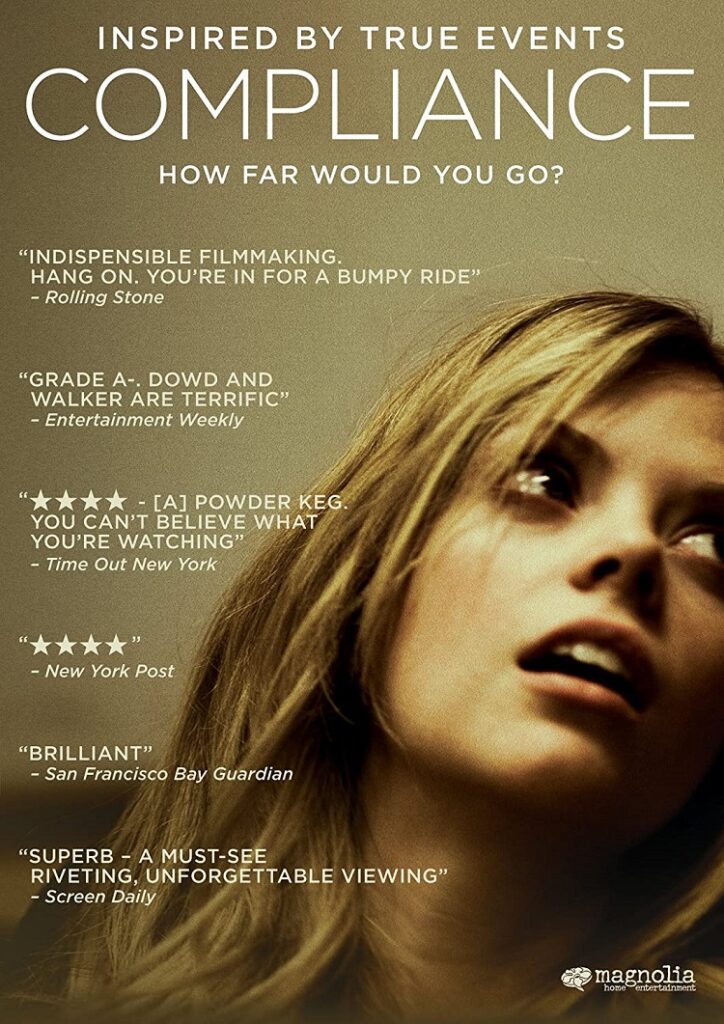
Compliance chronicles a day in the life of Becky (Dreama Walker), who went to work at her fast-food job like any other day. As business ramps up in the afternoon, a phone call comes into the restaurant from an Officer Daniels (Pat Healy) to Sandra (Ann Dowd), the manager of the eatery. Daniels claims to be conducting a police investigation of a theft that happened in the restaurant earlier that day, the supposed witness accusing Becky of the theft. From there, Daniels requests Sandra to isolate and detain Becky, which leads to further requests, escalated behaviors, and ultimately the rape and sexual humiliation of Becky in the tiny office/store room of her crappy part-time job.
If Compliance were a standalone, fictional tale of humiliation at the hands of people acting without thinking, it would be astoundingly terrible. The actions of virtually all of the characters are utterly reprehensible and without merit or consideration for the person around which they revolve. However, when taken as an amalgamation of accounts from 70 separate actual incidents that occurred in the U.S. in the last several years, the blame shifts. It’s not a terrible movie — it’s a condemnation of how thoughtless, immoral, and obedient people can be when given no concrete reason to do so.
The malicious Daniels has a knack for getting people to bend to his will solely by explaining consequences over the phone. Becky thinks a strip search at work is ludicrous, but when explained as “We can do this and have it be over with, or you can come downtown, get formally booked, held overnight in jail, and strip-searched by some complete strangers,” getting checked out by your manager and co-worker/friend doesn’t sound so bad. So she goes along with it. As business picks up, different people are rotated in to supervise Becky until Daniels can arrive. When asked why his arrival taking so long, Daniels concocts a story about investigating Becky’s brother for dealing drugs out of his house, and the available officers were held up sweeping that scene for evidence.
If you stand back from the situation and think about it for five seconds, none of it adds up, especially to anyone living in a country that obsesses over television shows about police stories and procedures. Every time I thought, “There’s no way someone would be this stupid,” in reference to the increased abuses being inflicted upon Becky, I reminded myself that this is the same country that had to put a warning on coffee cups that it might actually be, ya know, hot.
I came away from the film a little disturbed and disappointed in people for letting this slimeball get away with so many separate real-life offenses. What’s more bothersome is that, if he got away with it at least 70 different times, how many more calls were made where he didn’t? Viewers can peruse two behind-the-scenes featurettes, an interview with director/writer Craig Zobel, and the theatrical trailer. Might have been cool to get more information on the real-life investigation and apprehension of the caller, but I suppose that’s what the Internet is for.
The story’s ending did a bare minimum to tie up loose ends. We’re led to believe that the perpetrator was finally caught, but no mention of what charges were filed or what the punishment was for his crimes. Becky sues the restaurant and Sandra goes on TV to try to clear her name of wrongdoing but ends up making a fool of herself. That’s about it.
However, I get the feeling that that was part of the point. Crimes happen in the world every day for which no one is held accountable, or if they are, the punishment often doesn’t fit the crime. It’s not fair, and it can be incredibly disturbing and dumbfounding. Such is life, and such is Compliance.